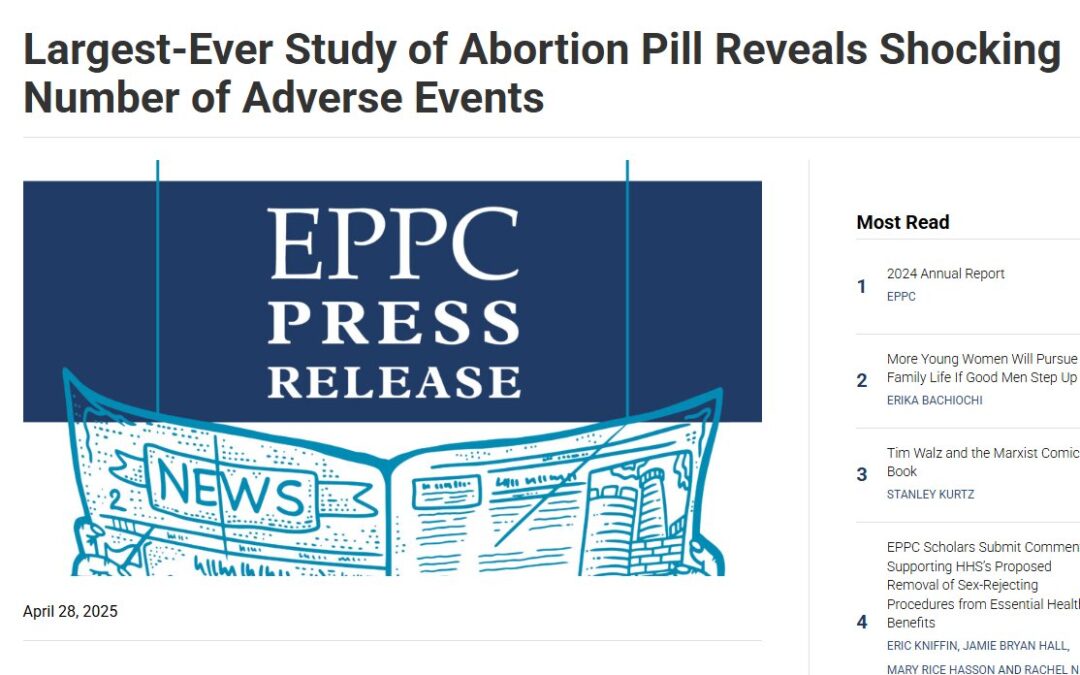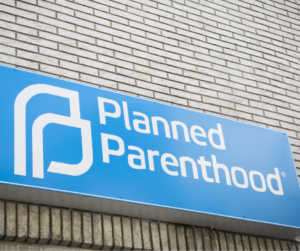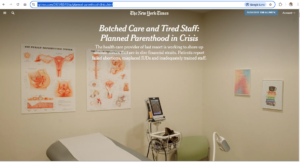April 28, 2025
Women are being misled. A major new study released this week confirms the dangers of the abortion pill, and shatters claims about its safety for women, revealing that one in ten women who take mifepristone experience serious or life-threatening complications. The findings, drawn from the largest real-world analysis to date, directly challenge messaging by Planned Parenthood and the abortion pill’s manufacturer, Danco Laboratories, who continue to market the drug as “very safe.” The study also calls into question the FDA’s rushed reversal of necessary medical safeguards, which opened the door to mail-order abortions.
The study, authored by Jamie Bryan Hall and Dr. Ryan T. Anderson of the Ethics and Public Policy Center, analyzed insurance claims for 865,727 mifepristone abortions between 2017 and 2023. It found that 10.93% of women suffered serious adverse events such as hemorrhage, sepsis, and infection within 45 days of taking the drug. This real-world complication rate is at least 22 times higher than the “less than 0.5%” rate cited in outdated clinical trials used by the FDA to justify approval.
The new report directly rebuts assertions like those made by Planned Parenthood and media outlets like CNN, whose website claims medication abortion is “safer than many other medicines like penicillin and Tylenol.” But when mifepristone’s safety is compared to real-world data on Tylenol (acetaminophen), this narrative collapses.
Tylenol, used weekly by an estimated 52 million Americans, leads to approximately 56,000 emergency room visits and 500 deaths annually—primarily due to misuse or overdose, not from correct use at therapeutic doses. This results in an approximate 0.001% mortality rate, far lower than mifepristone’s nearly 11% serious complication rate under normal use conditions. In contrast to Tylenol’s risk being largely preventable with proper dosing, mifepristone’s risks are inherent to the drug itself, now exacerbated by loosened FDA regulations that no longer require in-person doctor visits or thorough adverse event reporting.
“The Planned Parenthood narrative that mifepristone is somehow safer than Tylenol is scientifically absurd, a blatant piece of misinformation, and dangerously unethical,” said Josue Sierra, Communications Director for PA Family Institute. “This real-world study shows that the abortion pill carries serious, built-in dangers that have been deliberately minimized or ignored for the sake of profit.”
A Dangerous Shift in FDA Standards
Mifepristone was originally approved in 2000 under a fast-tracked process typically reserved for life-threatening illnesses. At the time, the FDA required three in-person visits, physician-only prescribing, and reporting of all serious complications. However, under successive Democrat administrations, these safeguards were dismantled.
Today, the abortion pill can be prescribed via a simple telehealth appointment and mailed directly to women without physical examinations or ultrasound confirmations, bypassing critical checks for life-threatening conditions like ectopic pregnancy. Furthermore, providers are no longer required to report complications unless a death occurs, severely limiting the public’s ability to assess the drug’s real risks.
In January 2023, the FDA eliminated the critical in-person dispensing requirement for chemical abortions, despite growing safety concerns. Today, chemical abortions account for over 56% of all abortions performed in Pennsylvania, reflecting a troubling rise in the use of these drugs without direct medical supervision.
Clearly, the data shows that this erosion of safety standards has left women vulnerable to serious medical crises. Without proper physician oversight, women are left to manage potentially life-threatening conditions at home, often alone and far from emergency medical care.
A heartbreaking example of these dangers recently emerged in Lancaster County, Pennsylvania (based on media reports). After rightly being turned away by an abortion clinic because her pregnancy was too far along, a teenage girl from East Donegal Township obtained abortion pills online. Left alone, she delivered a fully formed baby, reportedly still moving, and later buried the baby in her backyard. Her tragic text messages to a friend—describing the baby’s fingernails, lips, and movement—highlight the brutal, isolating reality of chemical abortion. This devastating incident underscores the abandonment of women by an industry more focused on growing political influence and revenue than ensuring real care.
Calls for Urgent FDA Action
Given the staggering real-world harm revealed in their findings, the study’s authors urge the FDA to immediately reinstate its original, stricter Risk Evaluation and Mitigation Strategy (REMS) for mifepristone. This would include:
- Requiring three in-person physician visits,
- Limiting prescriptions to licensed doctors only,
- Mandating full adverse event reporting, and
- Restricting the use of the drug to early pregnancies only (seven weeks or earlier).
Ultimately, Hall and Anderson argue, the FDA should reconsider mifepristone’s approval altogether based on objective safety criteria. Women deserve better than a drug that puts one in ten of them at serious risk of sepsis, hemorrhage, infection, or worse.
“We should not have FDA approved drugs with the sole purpose of killing.”
Ryan T. Anderson
The Growing Dominance of Chemical Abortion
The stakes are high. Chemical abortions, most often involving mifepristone and misoprostol, now account for nearly two-thirds of all abortions performed in the U.S. Since 2000, Danco Laboratories claims that over five million American women have used its abortion pill. Yet with chemical abortion rising in prevalence, the need for transparent, accurate safety data is more critical than ever.
“This new study offers the clearest picture yet of the true dangers of the abortion pill,” said Michael Geer, the CEO of the PA Family Institute. “The reality is that Planned Parenthood and abortion pill advocates have been misleading women about the risks for years. The FDA must act swiftly to protect women’s health before more lives are endangered.”
Adding to this, Lauren Hackett, Legal Counsel with the Independence Law Center at the PA Family Institute, wrote in an op-ed published with The ChristianPost.com, “The real threat to women’s health comes from pro-abortion activists masquerading as journalists who spread misinformation for political gain. Their tactics frighten vulnerable women away from seeking necessary medical care — the very people they claim to protect. Tragically, this deception can have fatal consequences. Pro-abortion forces appear more concerned with protecting industry profits than with the health and well-being of women and girls. If the media did its job, it would investigate and hold the FDA accountable to its mission of protecting women’s health and would report honestly about the harm caused by abortion drugs.”
Far from the harmless image promoted by Planned Parenthood, real-world evidence now shows that the abortion pill is associated with serious, sometimes life-threatening consequences at alarmingly high rates. Women deserve full transparency, real medical oversight, and better, safer options—not marketing slogans disguised as medical advice.
The new study marks the first installment of a broader research series aimed at investigating women’s health outcomes post-abortion. As more real-world data becomes available, the need for reform—and accountability—will only grow stronger.
This paper is the first in a series by EPPC investigating women’s health and abortion using real-world data.




